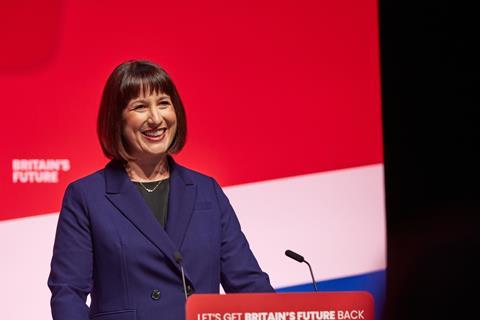Infrastructure investment and planning reform two of ‚Äėthree pillars‚Äô of party‚Äôs economic strategy
A Labour government would put planning reform ‚Äúat the very centre‚ÄĚ of its economic policy, the shadow chancellor has announced.
In a major speech to business leaders yesterday (Tuesday), Rachel Reeves set out the three pillars of an economic strategy which she said would usher in ‚Äúa new chapter in Britain‚Äôs economic history‚ÄĚ.
Delivering the annual Mais Lecture in the City of London, Reeves said the UK was standing at an ‚Äúinflection point‚ÄĚ as it had at the end of the 1970s.

She described how her vision for growth would be underpinned by the three pillars of ‚Äústability‚ÄĚ, achieved through monetary policy and financial regulation, ‚Äúinvestment‚ÄĚ, largely into infrastructure and the green economy, and ‚Äúreform‚ÄĚ of planning and the labour market.
Reeves described the planning system as ‚Äúthe single greatest obstacle to our economic success‚ÄĚ, making land ‚Äúcostly and inefficiently utilised‚ÄĚ and raising the cost of building infrastructure.
‚ÄúAnd it prevents housing from being built where it is most needed ‚Äď contributing to ever-higher prices and falling rates of home ownership and constricting the growth of our most productive places,‚ÄĚ she continued.
She said that planning reform had ‚Äúbecome a byword for political timidity in the face of vested interests and a graveyard of economic ambition‚ÄĚ but said it was ‚Äútime to put an end to prevarication and political short-termism on this question‚ÄĚ.
>> Top construction figures join Labour’s infrastructure review
>> Labour will put construction at heart of recovery, says Starmer
‚ÄúThere is no other choice. This Labour Party will put planning reform at the very centre of our economic and our political argument,‚ÄĚ she added.
Reeves promised a Labour government would deliver a ‚Äúonce-in-a-generation‚ÄĚ overhaul of the nationally significant infrastructure regime, updating all National Policy Statements within six months of coming into office.
She also re-iterated Labour’s plans to reintroduce mandatary local housing targets, recruit hundreds of new planners to tackle backlogs, and bring forward a new generation of New Towns.
Regarding the second pillar, Reeves described the ‚Äústop-go cycle of capital investment‚ÄĚ as the ‚Äúnew ‚ÄėBritish disease‚Äô,‚ÄĚ an allusion to the term used to describe the low rates of capital investment and labour productivity experienced by the UK in the 1970s.
‚ÄúShort-term instability inhibits investment and drives up infrastructure costs, resulting in fewer, and smaller, new capital projects,‚ÄĚ she said.
She said a Labour government would create a new British Infrastructure Council, which she has already established in shadow form with representatives of large UK and global investment funds.
Election focus

As thoughts turn towards the next general election, the UK is facing some serious problems.
Low growth, flatlining productivity, question marks over net zero funding and capability, skills shortages and a worsening housing crisis all amount to a daunting in-tray for the next government.
This year’s general election therefore has very high stakes for the built environment and the economy as a whole. For this reason,
ļ√…ęŌ»…ķTV is launching its most in-depth election coverage yet, helping the industry to understand the issues in play and helping to amplify construction‚Äôs voice so that the government hears it loud and clear.
We kick off this month with a three-parter looking at the state of play across three key topic areas.
ļ√…ęŌ»…ķTV is investigating the funding gaps facing the next government‚Äôs public sector building programmes, looking at the policy options available to the political parties.
In the coming months our ļ√…ęŌ»…ķTV Talks podcast will focus on perhaps the hottest political topic: the housing crisis. The podcast will feature interviews with top industry names who side-step soundbites in favour of in-depth discussions.
As the main parties ramp up their policy announcements, we will keep you up to date with their latest pledges on our website through our ‚Äúpolicy tracker‚ÄĚ.


























No comments yet